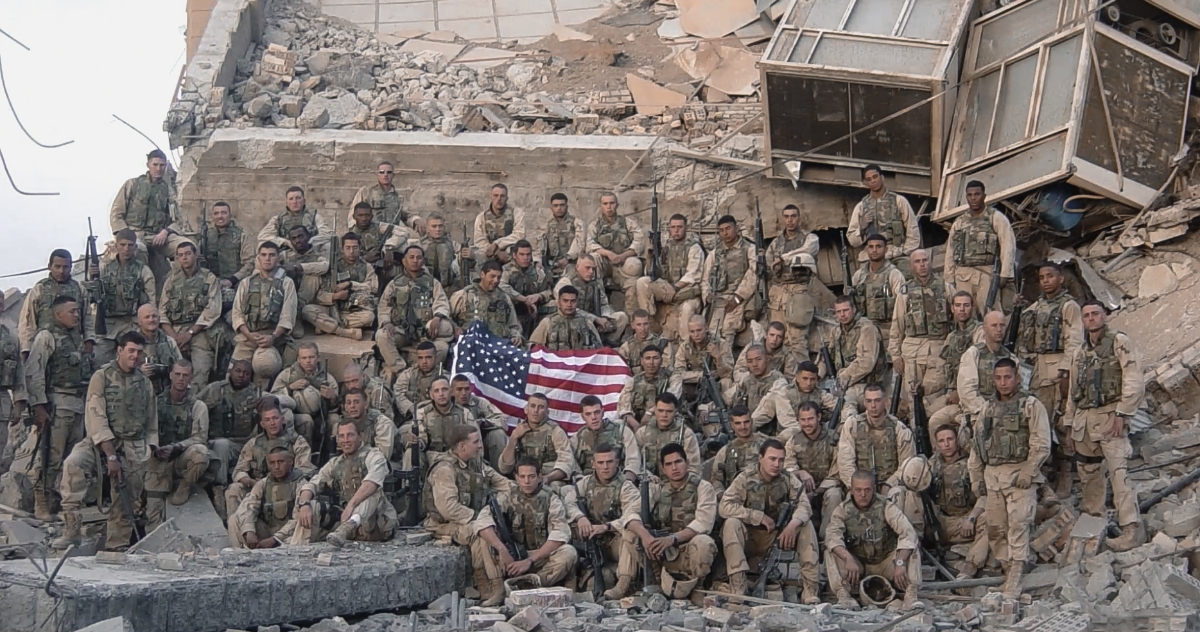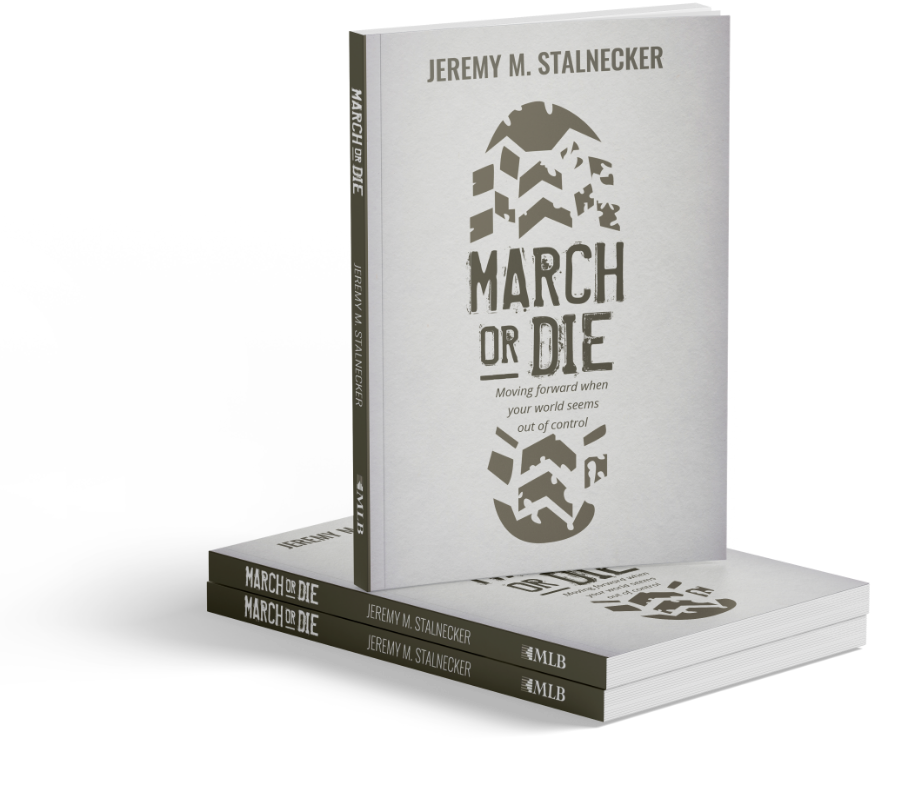Why March or Die?

I’m always interested in hearing about the defining moments in people’s lives, the moments that had a significant impact on them and in some way shaped how they look at the world. These could be tragic events, such as the death of a loved one, or important victories in sports, school, or work. Defining moments are not necessarily the most significant events, just the ones that, for some reason, impacted them more significantly than others.
For me, one of these life-defining events took place on April 1, 2003 at a small bridge over the aptly named Saddam Canal.
By April 1 our battalion had been traveling toward Baghdad for almost two weeks. There is a major highway that extends north from the Kuwaiti border, and we were doing our best to move up this road as quickly as possible. At the time it felt like all we were doing was driving, but, in retrospect, we made relatively little progress. It was like a really long, really slow road trip with a thousand friends who were quickly getting tired of each other. Only without the snacks and energy drinks. There was a lot of dirt, too, and we had to sleep sitting up in our Humvee, so there was that.
Apart from the opening days of the war, we did not experience much that could be called combat. There were a few skirmishes here and there, along with a pretty significant sand storm, but for the most part we drove and we waited (which is probably why everyone was getting tired of each other). It’s funny how quickly things can change.
During the morning commanders’ brief we were given the task of securing a small bridge traversing one of the many canals in Southern Iraq. Not surprisingly, the canal was, like so many things in this country, named after the dictator we were trying to remove. Our mission was to get to the bridge and set up a secure checkpoint so that another battalion could cross while continuing north. The intelligence we received indicated that there were no enemy troops there, so we would set up our checkpoint in the middle of the day because it was unguarded. It was always better to deal with the enemy at night when we had the advantage, but it was definitely easier to move during the day, particularly when there weren’t any threats.
Hindsight is twenty-twenty, as they say, but it should’ve seemed odd that the division was sending a battalion of Marines to secure a small, unguarded bridge. But for some reason, attacking an unguarded bridge in the middle of the day with 1,200 Marines made perfect sense at the time.
As our battalion pushed toward the objective my platoon took its normal place in the column. Not only did we navigate for those coming behind us, but our vehicles also provided forward security since we had heavy machine guns. Bravo Company was behind us and would be the main effort in setting up the checkpoint. Our job was to get to the bridge safely and get out of the way so they could go to work. Simple enough, and something we had trained to do many times before.
German military strategist Helmuth Von Moltke famously said, “No plan survives contact with the enemy,” and ours definitely did not. The ground and road leading up to the bridge were flat and free of any vegetation and reminded me of the fields in California where I grew up just after they were prepared to be planted. The clear, flat ground and the late afternoon sun allowed us to see the objective from a distance of what seemed like a few miles. In reality it was probably less than a mile (memory tends to distort distance), and as soon as we hit the straight section of road that led onto the bridge, the artillery rounds began to fall. This “unguarded” objective had a battery of D-30 artillery pieces firing 122mm artillery shells on top of our road.
I will never forget the taste and smell of the smoke as those rounds narrowly missed us. I knew that the battalion had artillery available to us but was out of radio range to do the necessary coordination. We worked to relay messages back to our Fire Support Center, but we were in a spot where there was nowhere to take cover, and the enemy was actively engaging us.
We did our best to continue pushing toward the bridge to get into position, but it didn’t take long for us to figure out that the artillery was not the only thing waiting for us. Dug into the side of the hill facing us was a company-sized element of Saddam’s Republican Guard (the guys I had been hearing about since the Gulf War twelve years earlier). We found out the size and origin of the unit later, but the threat they posed to us and the other Marines in the battalion was immediately clear.
We now had a second severe threat that we hadn’t anticipated and that could, if not dealt with, be fatal.
UNDERSTAND THAT THE BIGGEST FIGHTS IN LIFE COME WHEN WE LEAST EXPECT THEM.
Because of my own life experiences and listening to others talk about theirs, I’ve realized that the next battle always seems to pop up seemingly out of nowhere, when things are going well. All the intelligence tells us that everything is fine and will continue to be for the foreseeable future. But then something happens. A financial reversal, the loss of a loved one, or an unfavorable doctor’s visit—all situations that we didn’t see coming—throw us into a tailspin from which we struggle to recover.
Understanding that these fights will come is important. Not so that we can live life scared or overwhelmed with anxiety about the future, but so that we are prepared when the unexpected happens. I have met and talked to so many people who have given up in life because a battle came that they didn’t expect. They have been hurt, but instead of dealing with the hurt and working to make the situation better, they become life-long victims of a one-time event. Because they did not expect the problem, they allowed it to overwhelm and sideline them when it did come.
Others allow the unexpected battles of life to drive them into a deep state of introspection. They freeze as they try to figure out what they did wrong to deserve their current circumstances. While it’s true that sometimes we end up in the middle of something hard because we made a bad decision, it is also possible to do everything right and still have artillery rounds dropped on us.
When you find yourself in an unexpected fight, change any bad behavior that may have gotten you there and then stop trying to figure it all out. You have a fight in front of you, and worrying about how you got there will only get you killed.
YOU MAY NOT BE ABLE TO CHOOSE THE FIGHT, BUT YOU CAN ALWAYS CHOOSE HOW YOU FIGHT.
When we finally made it to the enemy soldiers who were using everything they had to kill us, we did exactly what we were trained to do. We overwhelmed them with the necessary force to ensure that we would win the battle. We had trained in peace so that when a situation like this one popped up unexpectedly, we would respond quickly and accurately. Which we did.
There is an ancient proverb (I don’t actually know how ancient or how proverbial, but it is a good saying) that says, “The more we bleed in peace, the less we bleed in war.” Often, even though we did not choose the fight or the battle, we can still come out on top if we are prepared. Although I was never a Boy Scout, I have always liked their motto, “Always be prepared.” While I’m sure it’s impossible to be prepared for everything we might encounter, we need to live with a preparedness mindset. Always learning and growing so that when we do deal with the unexpected, we will at least know where to begin. When we drift through life unprepared for the difficult times that we’ll inevitably face, we may not die physically (as in war), but we will die emotionally and spiritually.
You may not get to pick the fight, but decide before the fight comes to you that you will not let it keep you down and that you will do everything you can to win. There are so many people who live their lives just getting by, which keeps them one bad event away from a major failure.
We may not get to choose the fight, but if we prepare before it comes—and it will—then we can choose how we fight. The enemy is waiting; we need to get ready.
CHANGE IS INEVITABLE—DON’T BE SURPRISED WHEN IT HAPPENS.
As the battle unfolded, it quickly became apparent that the original plan of staying on the near side of the bridge was not the best course of action. As we worked to figure out how to deal with the incoming artillery, a new threat presented itself. Our enemy had set up an anti-aircraft gun on top of the bridge as a measure to keep helicopters from flying over. It decided that at the moment, we were more of a threat than aircraft.
The gun was probably no more than fifty yards away and intent on keeping us off of the bridge. Even though we were trained to deal with many different types of enemy weapons, never once did we talk about how to deal with an anti-aircraft gun rotating all four barrels in our direction. I had been confident up until that moment that not being a pilot would keep me out of a scenario like this one.
The situation had changed, and it had changed quickly. Apparently the enemy was allowed to adjust our plan, and even though our mission was to stop just short of the bridge, we pushed all the way to the top so that we could deal with this new threat.
I made some mistakes that day that I’m sure put the platoon in a more dangerous situation than was necessary. One thing we did not do, however, was stop and talk about how the situation was changing and that the enemy was not playing along with our plan. We were able to adjust as circumstances changed because changing circumstances, although they did cause some friction, did not surprise us.
It’s amazing how well you’re able to deal with a changing situation when you don’t allow it to surprise you. It has been said that the only constant is change, and this is certainly true in combat. Thankfully, because of quick action and accurate fire, we were able to take the anti- aircraft gun out of commission.
So here is the question: How many times have you put a plan together meant to deal with a difficult situation and then something changed? You decided that you were going to deal with the battle in front of you, but your plan began to fall apart, and when it did, so did you! So much emotional energy is required to even decide to fight (particularly when you didn’t choose the fight, when it’s not your fault) that when circumstances change we become too overwhelmed to go on. Most of us like to have control, and a loss of control damages our pride and drains away whatever motivation we had. This is why relationships that once appeared to be strong begin to disintegrate after a family tragedy or financial difficulty. A loss of control due to a changing situation begins to erode our motivation to continue on in other important areas of life. We did not expect things to change, so we weren’t prepared when they did.
Just as the battles come when we least expect them, so does change. Build change into your plan, and then when it happens you won’t be knocked off guard! Do your best to move forward with the information available to you, but be ready to adjust the plan when the circumstances surrounding you shift. Whether in combat or life, it is those who know how to quickly deal with change who will come out on the other side victorious.
WHEN YOU ARE STUCK, YOU ONLY HAVE TWO OPTIONS: MARCH OR DIE.
Getting on top of the bridge to deal with the anti-aircraft gun was a good move. Staying there was not. In the heat of the battle I managed to get eight of my vehicles into a very small space that made us a big target. In fact, the D30 artillery battery must have planned for this because the artillery rounds quickly began to fall around us. It’s a miracle that no one was killed while we sat there.
We quickly understood that the top of the bridge was a target that our enemy had previously established and that we were in the aptly named “kill zone.” As I stood outside my vehicle trying to direct the fight on the radio, a round fell so close that the explosion sent a shockwave through my body. I can almost feel it even now as I think back on that moment. It was how I imagine running full-speed into a wall feels like, only I didn’t fall.
The smoke was so thick around us that I thought one of the rounds had blown up a vehicle. Another explosion caused one of our section leaders to fly off his feet and land on his back. We were in a bad situation that was quickly getting worse.
I wouldn’t have been able to say it exactly like this as it was happening, but my platoon was stuck in a spot with only two options: Stay where we were and die or move to a better fighting position. This is where our training and preparation kicked in. The leaders in the platoon intuitively understood that we needed to move and, almost in unison, we did. We quickly moved off the top of the bridge and finished the fight in a place where we could win. When caught in a bad situation we knew, just as I had learned a few years before in Charlie company, that we either needed to march or die!
Here is the point: When you find yourself stuck, whether in a place of your choosing or not, you only have two choices. You can either choose to stay where you are and die, or you can get up and march to a place where you will be able to win the fight.
It’s remarkable how many people who find themselves in a bad situation simply lay there and die instead of getting up and taking the steps necessary to move beyond their situation. It may not be a physical death, but it is an emotional or spiritual death that may, in fact, be worse.
Breathing and working a job and making others think that you have it all together is not the same as living. Living is getting up every day and taking the steps that need to be taken to fulfill the purpose for which you were created. Allowing an unexpected battle to keep you from moving forward is making the decision to die.
The decision to march, however, is refusing to let your circumstances, whether present or past, define your present or your future. Marching, just like life, takes place one step at a time! You may not have all the answers, but you make the best decisions you can with the information you have and take the next step you know you should take. It’s amazing what will happen when you simply decide that you are not going to quit. Although your trials may be complex, your options in the middle of those trials are simple: March forward one step at a time or stay where you are and die.
BAD DECISIONS DO NOT NEED TO BE FATAL.
We often find ourselves in a battle because of the bad decisions we’ve made. Disintegrating relationships, financial challenges and a lack of direction can be imposed on us, but more often they are the result of things we’ve done. We look around for someone to blame for the circumstances of our life, but the only ones we can honestly blame are ourselves. This can be an overwhelming realization that can cause us to quit instead of motivating us to get up and make a change. Instead of marching forward, we stay where we are because it’s our fault, after all.
The goal is not perfection but persistence. The only one who can disqualify you from living a life of value and purpose is you. So often we disqualify ourselves when, really, we just need to take the next step.
As this engagement with the enemy came to an end I remember experiencing an overwhelming peace along with the thought that it just doesn’t matter. It does not matter who you are or where you came from or even what qualifies you to be here. The best you can do is the best that you can do, even in the worst situations. You are not responsible for anything outside of your control, but you must do your very best to control the things you can.
Combat, physical or otherwise, does not care who you are. Take the pressure off yourself, stop disqualifying yourself because of something that you have done or something that has been done to you, and put one foot in front of the other. You need to march so that you will not die. The goal is not perfection. Its persistence.
CONCLUSION
We make life so complicated when, really, it’s pretty simple. Even though we may find ourselves in complex situations, the decision we need to make in the middle of them is not. Whether the battle is one of our own making or one that was forced on us by someone or something else, we need to decide that instead of giving up and staying where we will die an emotional and spiritual death, we are going to march forward one deliberate step at a time. The choice is and will always be yours.
So what are you going to do? Will you march or will you die? The time to decide is now!
Subscribe Buy a Copy
Stay up to date
Join the newsletter to stay up to date on latest episodes and more...





